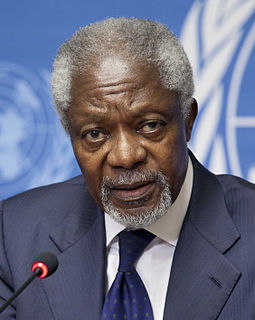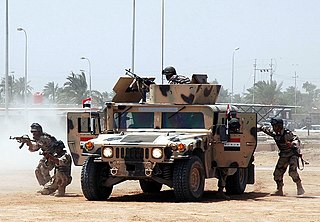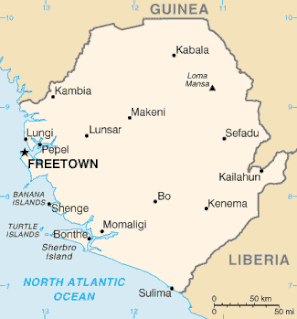
Kofi Atta Annan was a Ghanaian diplomat who served as the seventh Secretary-General of the United Nations from January 1997 to December 2006. Annan and the UN were the co-recipients of the 2001 Nobel Peace Prize. He was the founder and chairman of the Kofi Annan Foundation, as well as chairman of The Elders, an international organization founded by Nelson Mandela.

The secretary-general of the United Nations is the head of the United Nations Secretariat, one of the six principal organs of the United Nations. The secretary-general serves as the chief administrative officer of the United Nations. The role of the United Nations Secretariat, and of the secretary-general in particular, is laid out by Chapter XV of the United Nations Charter.

United Nations Security Council Resolution 1723, adopted unanimously on November 28, 2006, after recalling previous resolutions on Iraq, the Council extended the mandate of the multinational force until the end of 2007.

United Nations Security Council resolution 1121, adopted unanimously on 22 July 1997, after recalling that the maintenance of international peace and security was one of the main purposes of the United Nations, the Council established the Dag Hammarskjöld Medal, named after the second Secretary-General Dag Hammarskjöld, awarded posthumously to United Nations peacekeepers.

United Nations Security Council resolution 1143, adopted unanimously on 4 December 1997, after recalling all previous resolutions on Iraq, including resolutions 986 (1995), 1111 (1997) and 1129 (1997) concerning the Oil-for-Food Programme, the Council, acting under Chapter VII of the United Nations Charter, extended provisions relating to Iraqi oil sales for a further 180 days to meet the humanitarian needs of the Iraqi people.

United Nations Security Council resolution 1197, adopted unanimously on 18 September 1998, after reaffirming its primary responsibility to maintain international peace and security, the Council addressed co-operation efforts with the Organisation of African Unity (OAU).

United Nations Security Council resolution 1250, adopted unanimously on 29 June 1999, after reaffirming all resolutions on the situation in Cyprus, particularly Resolution 1218 (1998), the Council addressed the Secretary-General Kofi Annan's mission of good offices in Cyprus.

United Nations Security Council resolution 1358, adopted by acclamation at a closed meeting on 27 June 2001, having considered the question of the recommendation for the appointment of the Secretary-General of the United Nations, the Council recommended to the General Assembly that Mr. Kofi Annan be appointed for a second term of office from 1 January 2002, to 31 December 2006.

United Nations Security Council resolution 1386, adopted unanimously on 20 December 2001, after reaffirming all resolutions on the situation in Afghanistan, particularly resolutions 1378 (2001) and 1383 (2001), the Council authorised the establishment of the International Security Assistance Force (ISAF) to assist the Afghan Interim Authority in the maintenance of security in Kabul and surrounding areas. It was the final Security Council resolution adopted in 2001.
United Nations Security Council resolution 1520, adopted unanimously on 22 December 2003, after considering a report by the Secretary-General Kofi Annan regarding the United Nations Disengagement Observer Force (UNDOF), the Council extended its mandate for a further six months until 30 June 2004.

United Nations Security Council resolution 1602, adopted unanimously on 31 May 2005, after recalling resolutions 1545 (2004), 1565 (2004), 1577 (2004) and 1596 (2005) on the situation in Burundi, the Council extended the mandate of the United Nations Operation in Burundi (ONUB) for a period of six months until 1 December 2005.

United Nations Security Council Resolution 1608, adopted unanimously on 22 June 2005, after recalling resolutions 1542 (2004) and 1576 (2004) on the situation in Haiti, the Council extended the mandate of the United Nations Stabilisation Mission in Haiti (MINUSTAH) until 15 February 2006 and increased its strength.

United Nations Security Council resolution 1620, adopted unanimously on 31 August 2005, after recalling all previous resolutions on the situation in Sierra Leone, the Council established the United Nations Integrated Office in Sierra Leone (UNIOSIL) for an initial period of twelve months beginning on 1 January 2006, to replace the United Nations Mission in Sierra Leone (UNAMSIL).

United Nations Security Council resolution 1632, adopted unanimously on 18 October 2005, after recalling previous resolutions on the situation in Côte d'Ivoire, including resolutions 1572 (2004), 1584 (2005) and 1609 (2005), the Council extended the mandate of a three-person group monitoring the control of weapons until 15 December 2005.

United Nations Security Council Resolution 1648, adopted unanimously on 21 December 2005, after considering a report by the Secretary-General Kofi Annan regarding the United Nations Disengagement Observer Force (UNDOF), the Council extended its mandate for a further six months until 30 June 2006.

United Nations Security Council Resolution 1650, adopted unanimously on 21 December 2005, after recalling Resolution 1545 (2004) regarding the situation in Burundi, the Council extended the mandate of the United Nations Operation in Burundi (ONUB) until 1 July 2006.

United Nations Security Council Resolution 1652, adopted unanimously on January 24, 2006, after recalling previous resolutions on the situation in Côte d'Ivoire, the Council extended the mandate of the United Nations Operation in Côte d'Ivoire (UNOCI) and supporting French forces until December 15, 2006. It was the first of 86 Security Council resolutions adopted in 2006, and the first of eight relating to the situation in Côte d'Ivoire.

United Nations Security Council Resolution 1658, adopted unanimously on February 14, 2006, after recalling resolutions 1542 (2004), 1576 (2004) and 1608 (2005) on the situation in Haiti, the Council extended the mandate of the United Nations Stabilisation Mission in Haiti (MINUSTAH) until August 15, 2006.

United Nations Security Council Resolution 1667, adopted unanimously on March 31, 2006, after recalling all previous resolutions on the situations in Liberia and the subregion, particularly resolutions 1626 (2005) and 1638 (2005), the Council extended the mandate of the United Nations Mission in Liberia (UNMIL) until September 30, 2006.

United Nations Security Council Resolution 1734, adopted unanimously on December 22, 2006, after recalling all previous resolutions on the situation in Sierra Leone, including resolutions 1620 (2005) and 1688 (2006), the Council renewed the mandate of the United Nations Integrated Office in Sierra Leone (UNIOSIL) until December 31, 2007.


















